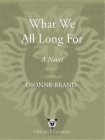What We All Long For, Dionne Brand [rom com books to read TXT] 📗

- Author: Dionne Brand
Book online «What We All Long For, Dionne Brand [rom com books to read TXT] 📗». Author Dionne Brand
Tuyen heard them hissing in whispered shouts, through her own sleep. Cam had been watchful to keep the whole family together. Tuan had paid off anyone they had to pay off for the passage on a boat to Hong Kong. Then Quy had drifted off in the night mist in a boat when one of them thought that he was with the other. Quy, their last child then and their first boy, so he was called precious. Their next son, the first born in Toronto, they called Binh, meaning “peace,” which was their beseeching for mercy for that terrible loss.
In Toronto, her father had tied them all to a cash register. Tuan used to be a civil engineer in Vietnam, Cam, a doctor. When they arrived in the promised land, the authorities would not ratify their professional documents, and Cam became a manicurist in a beauty salon near Chinatown while Tuan unloaded fruit and other produce from trucks to the backs of stores on Spadina. Cam knew nothing about manicures, of course, except what she had done with her own well-shaped hands weekly. But that was sufficient. The rest she faked. Renting a chair in a corner of the beauty salon on College Street, her quick elegance adding to the pretence, she set up the warm water for the hands, the little white towels, the cuticle remover, the nail buffer, the nail polish, and charged twenty dollars per customer. Pedicure was thirty dollars. On certain days Cam went to English language classes and on others she studied for her medical exams in English. This after being in practice in Saigon for seven years as a family doctor.
Tuan’s engineering came in handy at calibrating the weight of crates and boxes on his shoulders and back. His first two years he lifted lichees and jackfruit and sugar apples and star fruit and bean curd and dried mushrooms in all their assortments. Also lettuce and bok choy, Chinese cabbage, and bean sprouts. Fish and ducks, pig halves and the dead weight of frozen chickens. His back was either wet or cold most days. He graduated to selling at the front on the occasional summer day. When they figured out how—Tuan with his contacts in produce and with the money they’d brought with them plus the money they squirrelled away—they opened their own hole-in-the-wall restaurant off Spadina. After that there was no thought of being a civil engineer any more, or a doctor. Tuan knew he would never be allowed to build buildings. Cam was more hopeful, more dogged. She studied and studied, but always, four times, her English proficiency failed her. Never mind that she was probably only going to take care of Vietnamese patients who couldn’t understand English-speaking doctors anyway; never mind that she could turn a breach, never mind. She too gave up finally.
The restaurant became their life. They were being defined by the city. They had come thinking that they would be who they were, or at least who they had managed to remain. After the loss of Quy, it made a resigned sense to them that they would lose other parts of themselves. Once they accepted that, it was easy to see themselves the way the city saw them: Vietnamese food. Neither Cam nor Tuan cooked very well, but how would their customers know? Eager Anglos ready to taste the fare of their multicultural city wouldn’t know the differences. Luckily, national pride and discerning palates overtook the Vus and they hired a good cook, giving him a one-eighth share of the business, the only way they could keep him. The engineering skills came in handy again. How to fit thirty people into the tiny squarage of Saigon Pearl; the ergonomics necessary to urge them to leave so that another thirty could be seated within forty-five minutes; the right greeting and treatment so that thirty diners felt satisfaction, familiarity, yet not intimacy, which would make them linger. Then the translations that Ai, Lam, and particularly Binh and Tuyen, would have to facilitate.
Binh and Tuyen were born in the city, so they were born under the assumption that simply being born counted for something. They were required to disentangle puzzlement; any idiom or gesture or word, they were counted on to translate. Cam and Tuan expected much from them. As if assuming a new blood had entered their veins; as if their umbilical cords were also attached to this mothering city, and this made Binh and Tuyen not Vietnamese but that desired ineffable nationality: Western. For Tuan and Cam, the children were their interpreters, their annotators and paraphrasts, across the confusion of their new life.
Such power in children. Of course they became oracles of a kind too. Tuyen, perhaps, was the most savvy, and with a combination of her father’s affection and indulgence, she used this power to get her way always. Her desires were not as geopolitical as her parents, not as strategic, and because she was a child, they were far more personal. Like wanting a certain pencil or a certain piece of beef or candy or wanting to sit on this chair or that and throwing a tantrum if she was told to behave. Such power in children makes them become smarter than their parents much sooner than expected. And perhaps Binh and especially Tuyen became not only smarter than their biological parents but smarter than the surrogate city—the authorities whose requests and rules they translated for Cam and





Comments (0)